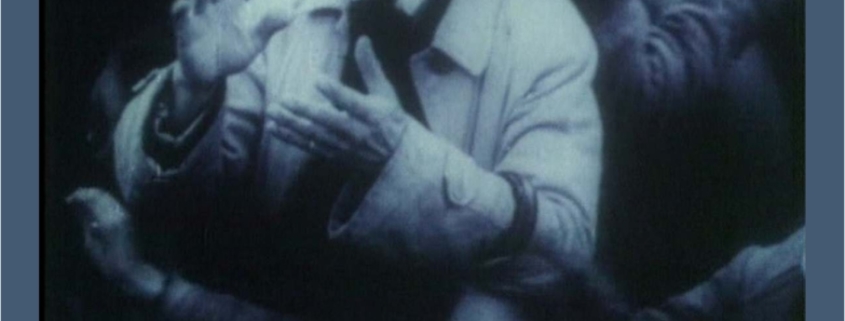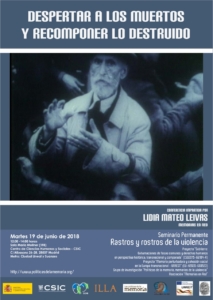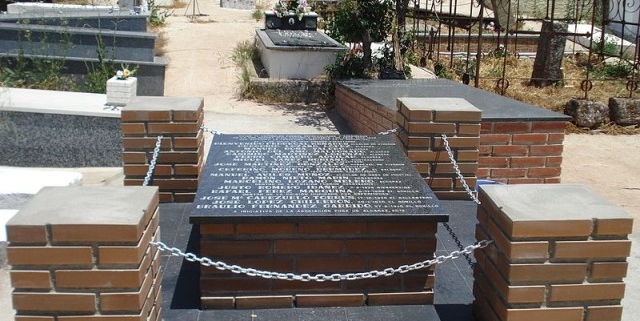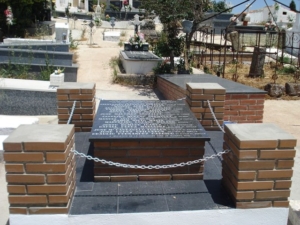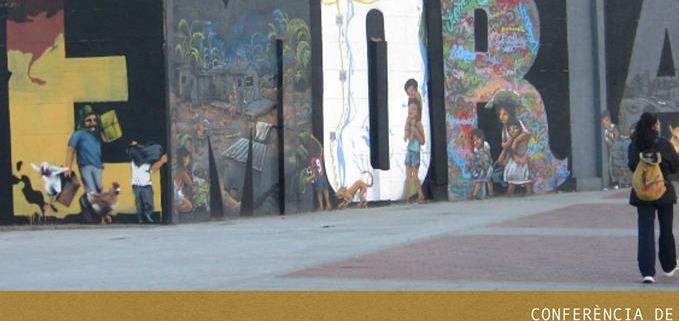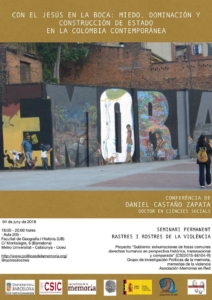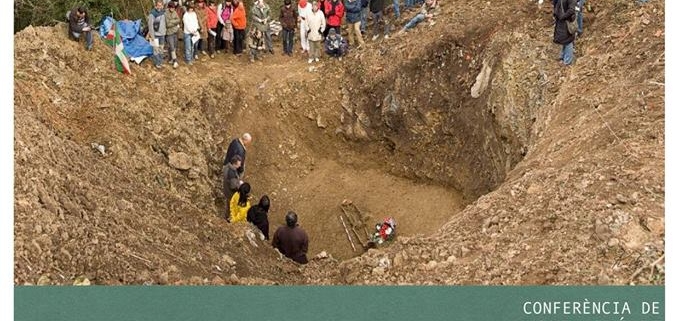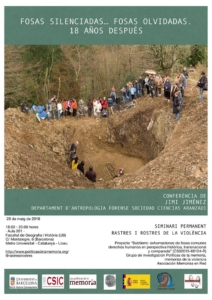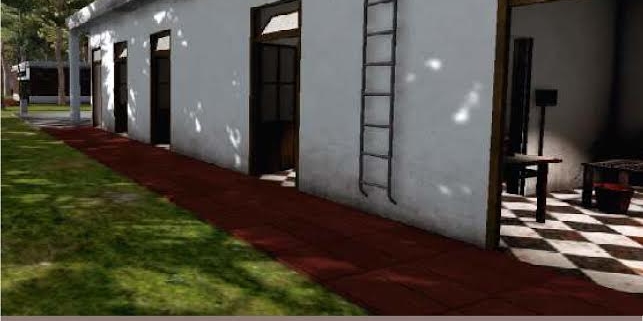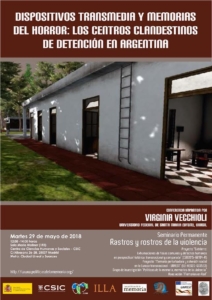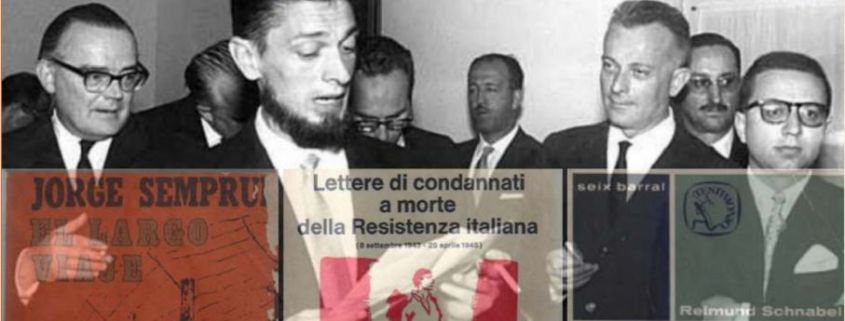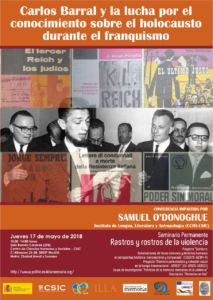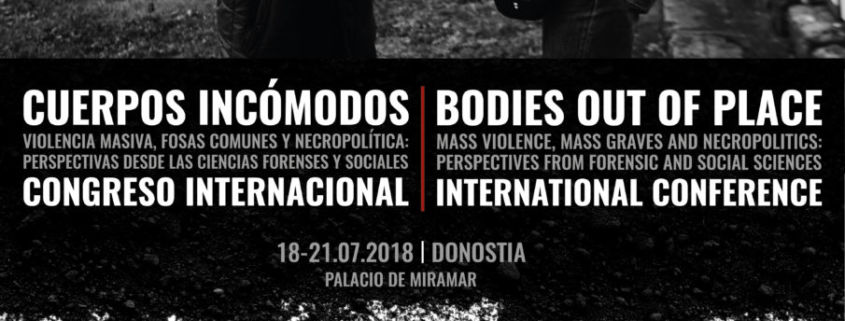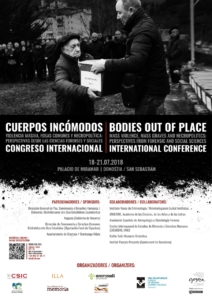
Cuerpos incómodos: Violencia masiva, fosas comunes y necropolítica.
Del 18 de julio al 21 de julio de 2018
Cursos de Verano UPV/EHU.
Del 18 de julio al 21 de julio de 2018
Cursos de Verano UPV/EHU.
Dirección científica / Scientific management: Francisco Etxeberria, Francisco Ferrándiz
Comité organizador / Organizing committee:
Cursos de verano UPV-EHU, Marije Hristova, Zoé de Kerangat, Laura Martín-Chiappe, Laura Langa y Miriam Saqqa.
Presentación:
Mesa 1: POLÍTICAS DE MEMORIA CONTEMPORÁNEAS EN EL ESTADO ESPAÑOL / MEMORY POLITICS IN CONTEMPORARY SPAIN
Coordinación / Convener:
Aintzane Ezenarro (Gogora)
Participantes / Participants:
Fernando Martínez López (Director General de Memoria Histórica del Gobierno de España)
PLENARIA 1 / KEYNOTE 1:
Alexei Yurchak (University of California, Berkeley/Institut d’Etudes Avancées, Paris): El cuerpo de Lenin, entre lo forense y el arte/ Lenin’ body between forensics and art.
PANEL 1: Antiguas violencias al descubierto/ Old Violences Exposed:
Moderación / Chair: Amaia Goenaga (Gogora)
Lourdes Herrasti (Aranzadi): La arqueología de las exhumaciones/ The Archaeology of Exhumations.
Zoé de Kerangat (CSIC/UAM): Cuerpos expuestos y rituales pre-forenses. Exhumaciones de víctimas de la represión franquista durante la Transición española/ Exposed Bodies and Pre-Forensic Rituals: Exhumations of the Victims of Francoist Repression during the Spanish Transition.
Antonius Robben (U Utrecht): Coping with Massive Urban Death: Mourning and Recovery during the German and Allied Bombing of Rotterdam/ Hacer frente a la muerte urbana masiva. Luto y recuperación durante los bombardeos alemán y aliados de Rotterdam.
Élisabeth Anstett (CNRS-Adés, Marseille): Silent Stocks: On Long Lasting Clandestine Mass Graves in Post-Soviet Russia and Elsewhere/ Inventarios silenciosos. Sobre las fosas clandestinas en la Rusia postsoviética y en otros lugares.
PANEL 2: Exhumaciones en el ámbito legal / Exhumations within Legal Realms:
Moderación / Chair: Laura Pego (UPV-EHU)
Francisco Etxeberria (UPV-EHU/Aranzadi): El papel de Aranzadi en las exhumaciones de fosas de la Guerra Civil / The Role of Aranzadi in the Exhumations of Graves of the Civil War.
Sévane Garibian (U Genève): Ley y restos humanos. En busca de un estatus jurídico / Law and Human Remains: In Search of a Legal Status.
Stephanie Golob (CUNY-Baruch, NY): Inside Out: Transnational Legal Learning and Mass Grave Exhumation / De la fosa al mundo. El aprendizaje legal transnacional de las exhumaciones.
Derek Congram (U Toronto): ¿“Mientras tanto, hasta cuándo? Medidas inmediatas para la recuperación de víctimas del conflicto en Colombia” / “In the Meanwhile”, Until When?: Immediate Meassures for the Recovery of the Victims of the Colombian Conflict.
PANEL 3: Exhumaciones en el sur global / Exhumations in the Global South:
Moderación / Chair: Marije Hristova (CSIC)
Laura Langa (CSIC/UAM): Espiritualidades y materialidades en torno a la muerte. El río Atá como fosa en movimiento y vida para los Yu´luuçx (Colombia)/Spiritualities and Materialities Around Death: The River Atá as a Moving Grave and Live for the Yu´luuçx (Colombia).
Luis Fondebrider (EAAF): Aspectos técnicos y sociales de las exhumaciones en Timor y Republica Centroafricana/Social and Technical Aspects of Exhumations in Timor and Central African Republic.
Carolina Robledo (CIESAS D.F., México): ¿Exhumaciones ciudadanas sin “verdad” y sin “justicia”? Dilemas y alcances en torno al trabajo colaborativo con “Las buscadoras de El Fuerte” (Sinaloa, México)/ Citizen-led Exhumations without “Truth” and “Justice?: Dilemmas around Cooperative Work with “Las buscadoras de El Fuerte” (Sinaloa, México).
PANEL 4:Aspectos religiosos de las exhumaciones / Religious Aspects of Mass grave Exhumations:
Moderación / Chair: Ulrike Capdepón (U Konstanz/Princeton)
María García Alonso (UNED): El poder de los huesos. Usos religiosos y profanos de las reliquias de la guerra civil española / The Power of Bones: Religious and Profane Uses of Spanish Civil War relics.
Miriam Saqqa (CSIC): Investigando la biopolítica del franquismo. Del cadáver al archivo / Investigating the Biopolitics of Francoism: From the Corpse to the Archive.
Marije Hristova (CSIC) y Monika Zychlinska (U Warsaw): Łączka in a Jar: Devotion and Sacralization in Mass Grave Exhumations of the Cursed Soldiers in Poland / Łączka en un frasco. Devoción y sacralización en las exhumaciones de fosas comunes de los soldados malditos en Polonia.
Germán Labrador (U de Princeton): La memoria y la piedra. La represión franquista y el arte popular en la Galicia de posguerra / The Memory and the Stone: Francoist Repression y Popular Art In Postwar Galicia.
PANEL 5: Exhumaciones y fantasmagorias / Ghostly Matters and Exhumations:
Moderación / Chair: Alejandro Baer (U Minnesota)
Paul Sorrentino (Max Planck Institute): Exhumations and Spiritualist Rituals in Contemporary Vietnam / Exhumaciones y espiritismo en el Vietnam contemporáneo.
Mariana Tello (CONICET, Argentina): Historias de (des)aparecidos. Los fantasmas de las fosas y las desapariciones / Stories of (Re) Apparition: Disappearances and Mass Grave’s Ghosts.
Francisco Ferrándiz (CSIC) / Julián López García (UNED): Tumbas, exhumaciones y memorias paranormales / Graves, Exhumations and Paranormal Memories.
PANEL 6: Relaciones de parentesco en las fosas comunes / Kinship Relationships around Mass Graves:
Moderación / Chair: Stephanie Golob (CUNY-Baruch)
Maria Laura Martín-Chiappe (CSIC/UAM): Empoderamiento político desde el reclamo familiar / Political Empowerment in Family Claims.
Alfonso Villalta (UNED): Enemigos y ayuda en el umbral de la muerte / Enmity and Help on the Eve of Death
Zahira Aragüete (U Genève): Recomponer la identidad familiar en el archivo antagónico de la represión en Extremadura / Remaking Familiar Identity through the Contested Archival Trace in Extremadura.
Victor Toom (Goethe University): Forensic identification of 9/11 victims in New York: Labs, Families and Politics / Identificaciones forenses de las víctimas del 9/11 en Nueva York. Laboratorios, familias y políticas.
PANEL 7: Exhumaciones y soberanía / Exhumations and Sovereignty:
Moderación / Chair: Marije Hristova (CSIC)
Queralt Solé (U Barcelona): Bertrán de Quintana, el juez de los cementerios clandestinos en Cataluña (1937-1938) / Bertrán de Quintana, the Judge of the Clandestine Cemeteries in Catalonia (1937-1938).
Sarah Wagner (Georges Washington U): Marking Presence, Absence, and Those in Between: A Story of Vietnam War MIA Accounting, Fifty Years Afterwards / Presencias, ausencias y espacios intermedios. La historia de los desaparecidos en combate norteamericanos de Vietnam, cincuenta años después.
Isaías Pérez-Rojas (Rutgers U): Soberanía en Ruinas. Necropoder, necrogubernamentalidad, y la figura del pueblo en los andes del Perú posguerra / Sovereignty in Ruins: Necropower, Necro-governmentality, and the Figure of the People in Peru’s Post-War Andes.
Natan Sznaider (Academic College Tel-Aviv): Guilt: The Materiality of a Sentiment / Culpabilidad. La materialidad de un sentimiento.
PLENARIA 2 / KEYNOTE 2:
Eyal weizman (Goldsmiths U): Forensic architecture / Arquitectura forense.
PANEL 8:Representaciones del giro forense / Representations of the Forensic Turn:
Moderación / Chair: Daniel Palacios González (U Köln)
Jean-Marc Dreyfus (U Manchester): A Discreet Visual Culture: Photos of Exhumations in Post-WWII Germany / Una cultura visual discreta. Fotos de exhumaciones en la Alemania de postguerra.
Lee Douglas (Museo Reina Sofia): Over, On, In: Forensic Vision and the Iconography of Recuperation / Encima, sobre, en. Visión forense y la iconografía de la recuperación.
Ulrike Capdepón (U Konstanz/Princeton): Monumentalidad y giro forense. Los debates actuales sobre la representación de los muertos en Madrid / Monumentality and Forensic Turn: Current Debates about the Representation of the Dead in Madrid.
Alejandro Baer, Brieanna Petersen y Joe Eggers (U Minnesota): De las “masacres Sioux” al “genocidio Dakota”. Representaciones de la “Guerra Olvidada” en Minnesota / From “Massacres perpetrated by the Sioux” to the “Dakota Genocide”: Conflicting Representations of Minnesota’s “Forgotten War”.
PANEL 9: Silencios, desapariciones y atopías/ Silences, disappearances and atopias
Moderación / Chair: Zahira Aragüete (U Genève)
Jose Luis Prieto (Consejo Médico Forense): Migración clandestina en el mediterráneo desde la perspectiva de la medicina forense: una catástrofe silenciosa / Clandestine Migration in the Mediterranean from a Forensic Perspective: a Silent Catastrophy.
Gabriel Gatti (UPV-EHU): El cuerpo (confuso) del desaparecido vivo. Estampas de Melilla, México y Uruguay / The (Confused) Body of the Living Disappeared: Images of Melilla, Mexico and Uruguay.
Zuzanna Dziuban (U Konstanz/U Amsterdam): Atopic Objects: The Afterlives of Golden Teeth Stolen from the Holocaust Graves / Objetos atópicos. El recorrido de los dientes de oro robados de las fosas comunes del Holocausto.
Mesa 2: Nuevos retos de la antropología forense: de la escena del crimen a la acción humanitaria /New challenges in forensic science: from crime scene to humanitarian intervention:
Coordinación / Convener:
Francisco Etxeberria (UPV-EHU/ Aranzadi)
Participantes / Participants:
Francisco Etxeberria (UPV-EHU/ Aranzadi)
Morris Tidball (U Coimbra y Milán)
Mercedes Salado (EAAF)
Lourdes Herrasti (Aranzadi)
Luis Fondebrider (EAAF)
José Luis Prieto (Consejo Médico Forense)
Fernando Serrulla (Asociación Española de Antropología y Odontología Forense)
Ignasi Galtés (Aranzadi-UAB-IMLCFC)
Mesa 3: Políticas de memoria contemporáneas en el Estado español / Memory Politics in Contemporary Spain
Coordinación / Convener: Aintzane Ezenarro (Gogora)
Álvaro Baraibar Etxeberría (Director general de Paz, Convivencia y Derechos Humanos del Gobierno de Navarra)
Javier Giráldez (Director General de Memoria Democrática de la Junta de Andalucía)
Eduardo García-Leonardo Tobarra (Jefe del Servicio de la Dirección General de Reformas Democráticas y Acceso a la Justicia Generalitat Valenciana)
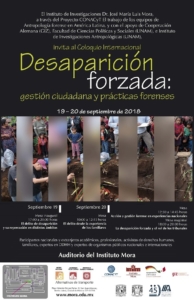

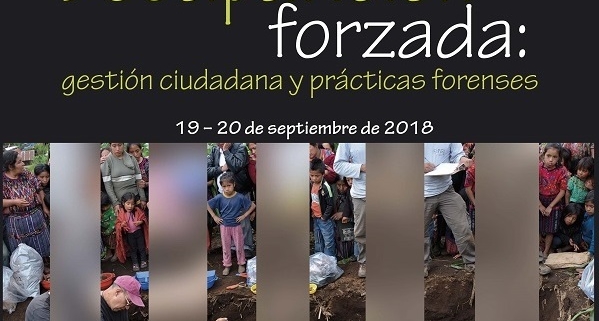
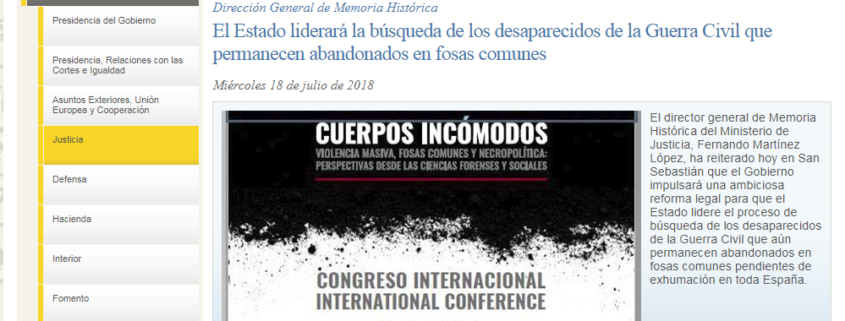

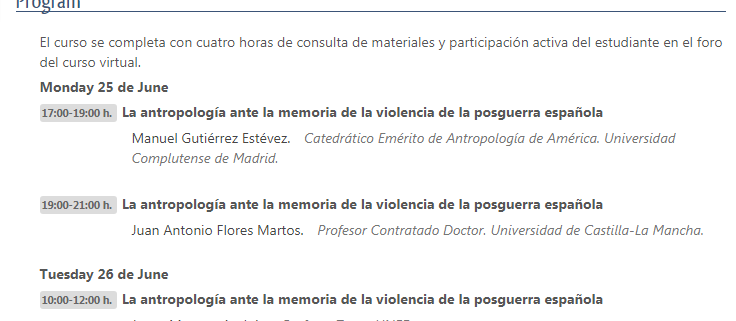
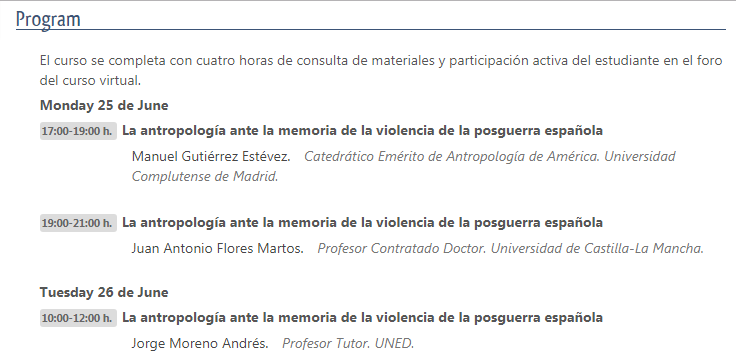 La antropología ante la memoria de la violencia de la posguerra española
La antropología ante la memoria de la violencia de la posguerra española 